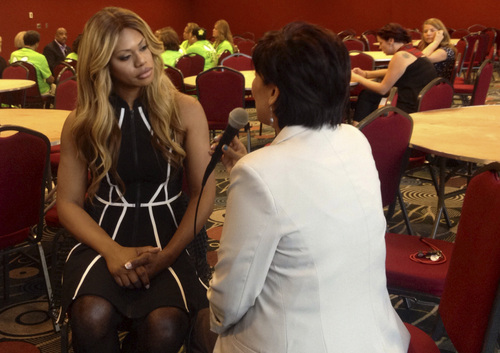This is an archived article that was published on sltrib.com in 2014, and information in the article may be outdated. It is provided only for personal research purposes and may not be reprinted.
Laverne Cox is part of a group that she calls "the least of the least."
It's no commentary on stature or success, which the first and only transgender Emmy nominated actor has seen plenty of this year, but, rather, a nod to the marginalized community of which Cox is a part: transgender women of color.
Transgender individuals are those whose gender identity or expression does not match a person's biological sex at birth.
It's an identity that rarely breeds power or influence, Cox said, but rather leaves droves of people disenfranchised and under-represented.
She is the exception, and she knows it.
Cox, best known for her role as an inmate in a woman's prison on the Netflix original series "Orange Is The New Black," has become something of a transgender ambassador, delivering speeches around the country about transgender visibility and issues facing the lesbian, gay, bisexual and transgender community.
As of last year, 90 percent of LGBT murder victims in the U.S. were racial or ethnic minorities and 72 percent were transgender women, according to the National Coalition of Anti-Violence Programs annual report.
Transgender people were also seven times more likely to experience violence at the hands of police than their non-transgender counterparts, the report states.
Cox was invited to Salt Lake City on Friday to be the keynote speaker at Equality Utah's Allies Dinner.
She said she hopes her own story can serve as an example to others: Cox was raised by a single, working-class mother in Alabama.
On Friday, after mingling with attendees clamoring to speak with her, get an autograph, snap a selfie, Cox sat down with The Salt Lake Tribune and reflected on how she got here, and what issues she sees facing tansgender people in Utah and the country at large.
Tribune • How does it feel to come to Utah and speak out at an event such as the Equality Utah Allies Dinner?
Cox • I was thinking earlier today about why I do this, and I decided I speak at events like this to not only speak the truth about my life but, hopefully, elevate the voices of other transgender folks who deserve to be heard. I think, too, we have things that we're passionate about and for me, certainly, LGBT equality is one, but so is violence against trans women and representation of trans people in the media. Those are kind of my focus because I think those things are really important to keep talking about and keep raising awareness about.
I'm really blessed that I get to have a platform where I can talk about these issues, and hopefully people are listening who can help make a change.
Tribune • What are some of the key points you hope attendees of the gala come away with tonight?
Cox • When I speak to LGBT activists and organizaitons, it's always important for me to remind everyone that the T should not be silent in the LGBT community, so, I'll be talking about that. I'll be talking a little bit about our history as LGBT people, I'll be telling a little bit of my story and talking about some of the moments from the past year that I've had and discussing them in the context of how we can really all work together across our differences to create change.
That's something that I'm really passionate about and is really important to me: Finding ways to have honest conversations that are not contentious, where people feel safe.
Tribune • What can Utah do to improve transgender visibility and address some of the issues that are particular to transgender people?
Cox • I think trans people's voices need to be heard. Even in places that are trans-friendly, a lot of the time trans people don't really feel or know that their community is as trans-friendly as it might be. That's why organizations and communities have to do outreach to let trans people know that it is actually safe. Then places that purport to be safe have to do what they can to ensure that they really are providing and maintaining those safe spaces for trans people to come and self-identify and feel a sense of community and home. We often don't feel that.
I'm really excited that Equality Utah chose not to support passage of a non-discrimination bill that would exclude transgender people when that was offered. I think working to get policies in place that support trans folks is important, but we also have to work on the hearts and minds of all people. Because we all know that just because there are laws in place doesn't mean people still don't experience discrimination. So, we still need to work on changing the hearts and minds of people, and celebrating and loving trans people, and accepting trans people on their own terms.
So often, people who are not trans have been leading the conversation. That's why it's so important to have trans people in positions of leadership in LGBT organizations, like Equality Utah, especially trans people of color. And not just in a tokenizing way — in a way that really elevates the voices of the people in our communities who are the least of the least, the people who are the most marginalized.
Statistically, in the LGBT community, that means trans women, particularly women of color. We are the most discriminated against, we experience the most violence. And that's why we have to do the most to raise awareness and change that.
Twitter: @Marissa_Jae



